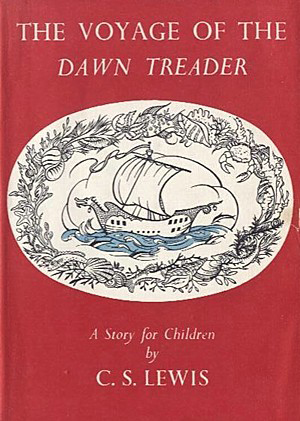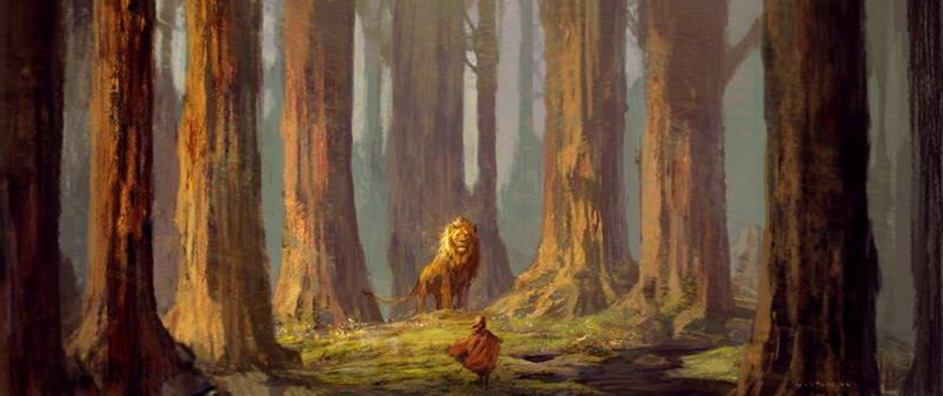The views expressed in our content reflect individual perspectives and do not represent the authoritative views of the Baha'i Faith.
O Son of Man! Veiled in My immemorial being and in the ancient eternity of My essence, I knew My love for thee; therefore I created thee, have engraved on thee Mine image and revealed to thee My beauty. – Baha’u’llah, The Hidden Words, p. 3.
In The Hidden Words, Baha’u’llah, writing in the voice of God, shares a glimpse of the Divine perspective with the quotation above. This powerful verse came to me immediately as I reread the passage below to my boys, again from The Silver Chair. Here, Eustace and Jill are puzzling about how they got into Narnia:
“Speak your thought, Human Child,” said the Lion.
“I was wondering–I mean–could there be some mistake? Because nobody called me and Scrubb, you know. It was we who asked to come here. Scrubb said we were to call to–to Somebody–it was a name I wouldn’t know–and perhaps the Somebody would let us in. And we did, and then we found the door open.”
“You would not have called to me unless I had been calling to you,” said the Lion.
In The Silver Chair, Jill and Eustace find themselves in “Aslan’s Country,” pictured as an Everest-high mountain looking down on the Narnian world. Aslan has given the two children four signs they must remember in order to complete their mission in Narnia. And before he dispatches them to the country below, he admonishes them:
… remember, remember, remember the Signs. Say them to yourself when you wake in the morning and when you lie down at night, and when you wake in the middle of the night. And whatever strange things may happen to you, let nothing turn your mind from following the Signs. And secondly, I give you a warning. Here on the mountain I have spoken to you clearly: I will not often do so down in Narnia. Here on the mountain, the air is clear and your mind is clear; as you drop down into Narnia, the air will thicken. Take great care that it does not confuse your mind. And the Signs which you have learned here will not look at all as you expect them to look, when you meet them there. That is why it is so important to know them by heart and pay no attention to appearances. Remember the Signs and believe the Signs. Nothing else matters. And now, Daughter of Eve, farewell—.
 In the same way, the guidance of the Baha’i teachings instruct us to pray and read from the Holy Writings in the morning and at night, and not let the materialism of the world as it exists today distract us from the spiritual reality that exists everywhere.
In the same way, the guidance of the Baha’i teachings instruct us to pray and read from the Holy Writings in the morning and at night, and not let the materialism of the world as it exists today distract us from the spiritual reality that exists everywhere.
Narnia, despite its inspirational impact, has some problems. More than once Lewis’ word choice betrays the European culture’s superiority complex, so common for his day. Good guys are generally lily white with all the cultural trappings of Anglo-Saxons; bad guys are pretty much straight-up Arabs if not Muslims. Good guys generally live in the northern lands of Narnia, bad guys in the south, etc.
His pre-modern shortcomings notwithstanding, I do think that Lewis’ own remarkable spiritual journey and lifetime of deep thinking put him in touch with profound spiritual truths that touched his readers and for us, can enable understandings beyond what even he intended.
At the close of book 3, The Voyage of the Dawn Treader, Lewis comes as close as anywhere in the series to explicitly stating his reason for writing the books. In this closing scene, Aslan breaks the news to Lucy:
“Dearest,” said Aslan very gently, “you and your brother will never come back to Narnia.”
“Oh, Aslan!” said Edmund and Lucy both together in despairing voices.
“You are too old, children,” said Aslan, “and you must begin to come close to your own world now.”
“It isn’t Narnia, you know,” sobbed Lucy. “It’s you. We shan’t meet you there. And how can we live, never meeting you?”
“But you shall meet me, dear one,” said Aslan.
“Are—are you there too, Sir?” said Edmund.
“I am,” said Aslan. “But there I have another name. You must learn to know me by that name. This was the very reason why you were brought to Narnia, that by knowing me here for a little, you may know me better there.”
Aslan’s point, that God speaks to humanity through the mysterious instruments of the Manifestations of God, means we must constantly stretch to understand just who they are. Shouldn’t we avail ourselves of every tool that can increase our understanding of them? Allegory, literature, and even fantasy can function as wonderful tools to increase our understanding and expand our capacity for metaphor and symbol.
















Comments
Sign in or create an account
Continue with Googleor